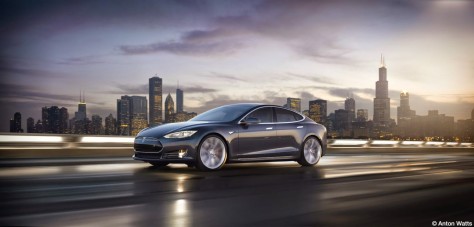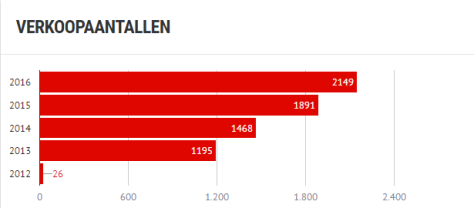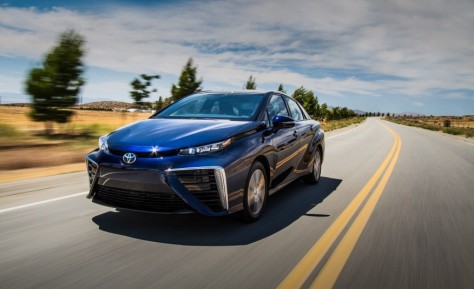By now, almost everyone with an internet connection in the western world must have heard about Tesla’s brilliant electric cars, haven’t you? The amount of Tesla cars sold in the Netherlands has doubled over the past 3 years. Which means that more and more people will have a Tesla, since the older ones are probably still around as well. This will lead to more charging stations as a convenience for the electric drivers… or will more charging stations lead to more cars? I wouldn’t be wrong in saying that electric cars are the future.
 Source: Anton Watts, https://goo.gl/E1GulM
Source: Anton Watts, https://goo.gl/E1GulM
This is not a problem if electric cars are the only applicable sustainable option. As Tesla started selling the first electric cars in the Netherlands, the municipalities started giving away free parking spaces with chargers for electric cars. Meanwhile, the government heavily subsidised the electric cars. Together, this led to a significant monetary benefit which boosted position of the electric car industry in the market.

Market share of Tesla Motors in the Netherlands (percentages)

Number of Tesla cars sold in the Netherlands (cars)
Source: https://goo.gl/EmYZwj
The investments of the governmental parties in the electric car practically eliminated the development of other energy sources for cars, like hydrogen or biofuels. We did the same thing in the early 1900s, but the other way around. The development of the electric cars was eliminated by the more efficient and cheaper gas powered cars, because at that time it was believed that fossil fuel powered cars were the superior alternative.
It is debateable whether we made a mistake choosing for the fossil fuel powered cars back in the 20th century, but let’s not make a mistake in the 21st century, and give all technological possibilities a chance! Fortunately, Toyota has released the Toyota Mirai in 2015, which runs on hydrogen and won the ‘World Green Car of the Year Award’ in 2016. Yet, neither have I seen this car in the Netherlands nor have I even heard of hydrogen fuel stations.

Source: Photography by Sean Rice, https://goo.gl/zSx2DY
The amount of hydrogen stations in the Netherlands is a disappointing number of only 2, which explains why I haven’t heard of them. This, while the amount of public electrical charging stations counts towards 25,000 at the time of writing this.

Number of charging stations for electrical cars in the Netherlands from 2010 to 2016, excluding private charging stations
Source: https://goo.gl/CAJZ6d
I’d like to conclude that it is ‘odd’ that electric cars seem to be the prospective future, while there is still at least one other viable possible solution.
We should not repeat history and pick a technology that suits us just for now, but stimulate multiple innovative concurrent solutions to build towards a better future. Toyota is still investing in their hydrogen car, so this technology will not be lost…. for now. And don’t get me wrong, electric cars are great. For the sake of sustainability, technology and the future, please think about these less known innovations, don’t they deserve more publicity and better chances to survive in the market?
Source Featured Image: https://goo.gl/SFTRZk

Thanks for this blog on the awareness of electric cars and their alternatives. However, I’m kind of missing why you think hydrogen cars could be a better alternative than electric cars. The main thing I can come up with is the material use of car batteries which could contribute to scarcity. Am I thinking in the right direction? Or am I missing something?
LikeLike
@wiljot Thanks for your question!
I think that it is sustainable to use different kinds of techniques to not run out of lithium for the batteries in electric cars, just like you mentioned.
Another advantage can be that you can pump hydrogen from a tank just like we do with fossil fuels now, while electrical charging takes ages. Because electrical charging takes such a long time, only a few cars can charge at a time, therefore you need to build a lot of stations.
But the point I was trying to make is that we should still invest in other techniques, because you never know which one will make a sustainable breakthrough, and neither do I….
LikeLike
The main reason why fuel cell (hydrogen) powered cars are not common currently is due to the low overal energy efficiency. Firstly, hydrogen is produced via natural gas reforming or electrolysis. Both of these processes are very energy intensive and either natural gas, or electricity is required. Secondly, the hydrogen needs to be compressed/liquefied. This is easier said than done, compressing gases is a relatively energy intensive and expensive procedure. This things make that fuel cell cars are ust not even rendable in energy use currently. Ofcourse, it has a lot of potential and I agree that we should avoid ‘tunnel vision’ into electric cars only (altough fuel cell cars are basically also electric).
LikeLike
@christianvds I totally agree with that, thank you for the input!
LikeLike
And there is another point that for the electrolysis very expensive resources are needed like platinum so that makes the cost rise up even more.
But most of the electricity in the netherlands is still based on natural gas. ([PDF]Elektriciteit in Nederland – CBS gave a graph till 2013 so it’s a little outdated but it shows what is used for the electricity use in the netherlands) so that would probably differs little from the need for the hydrogen production at the current stage.
“you can pump hydrogen from a tank just like we do with fossil fuels now.” which would mean that the infrastructure what is a major concern for every change, would not have to undergo a great change. This instead might limit the cost it will make.
But i agree that currently it is not rendable, and might need a whole lot of effort before it will reach that, but it has potential just like electric cars if the batteries would go on for a longer time and it wouldn’t take to long to be filled. And for both cases if there would be no need for the natural gas anymore.
LikeLike
@lysannestolk Thank you for the input!
LikeLike